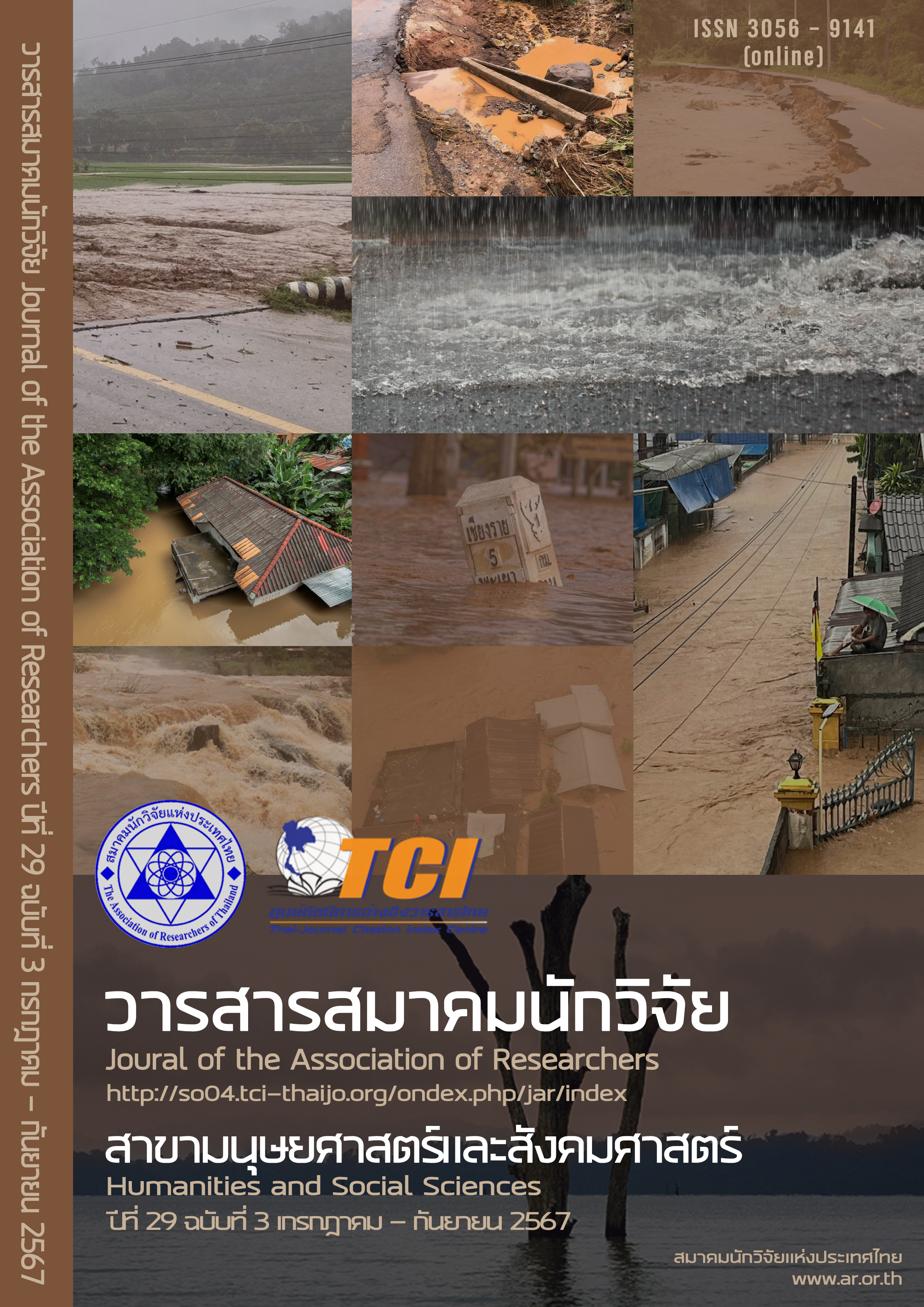Developing Desirable Characteristics of the Local Government
Main Article Content
Abstract
Local governments are important in managing the local budget. Having desirable characteristics is therefore of great importance to local development. This research aims to Develop guidelines for developing desirable characteristics of local government officials. A mixed methods research method was used. Quantitative data were collected using a 5-point scaled questionnaire from presidents of local administrative organizations, totaling 380 people. Qualitative data were collected by interviewing 20 experts. Data were analyzed using descriptive statistics. and structural equation modeling analysis techniques. and content analysis techniques. The research results found that 1) Government development and training Public participation in local development leader personality professional adaptability Desirable Characteristics of Local Administrators All at a very high level with an average between 3.78 - 4.02 2) Factors affecting the desirable characteristics of local administrators were development and training from the government sector. Public participation in local development leader personality professional adaptability able to jointly predict 88% 3) Guidelines for developing desirable characteristics consisted of 2 main approaches, namely, a guideline for developing a system for promoting desirable characteristics. and guidelines for promoting the working atmosphere of local government officials together with the people. A new finding from the research is the development of desirable characteristics of local government officials. There must be agencies to operate systematically and continuously, and creating an atmosphere that encourages people to participate in the work of local governments.
Article Details

This work is licensed under a Creative Commons Attribution-NonCommercial-NoDerivatives 4.0 International License.
บทความที่ปรากฏในวารสารนี้ เป็นความรับผิดชอบของผู้เขียน ซึ่งสมาคมนักวิจัยไม่จำเป็นต้องเห็นด้วยเสมอไป การนำเสนอผลงานวิจัยและบทความในวารสารนี้ไปเผยแพร่สามารถกระทำได้ โดยระบุแหล่งอ้างอิงจาก "วารสารสมาคมนักวิจัย"
References
โกวิทย์ พวงงาม. (2553). การจัดการตนเองของชุมชนและท้องถิ่น. กรุงเทพฯ: บพิธการพิมพ์.
จิราวรรณ แสงตันชัย. (2561). แนวทางการพัฒนาบุคลากรในองค์กรปกครองส่วนท้องถิ่นสู่ความเป็นเลิศ กรณีศึกษาองค์การบริหารส่วนจังหวัดเลย. วารสารวิจัยและพัฒนามหาวิทยาลัยราชภัฏเลย. 13 (43): 53 – 62.
จรัส สุวรรณมาลา และวีรศักดิ์ เครือเทพ. (2554). ประเด็นท้าทายการกระจายอำนาจและการปกครองท้องถิ่นไทย. กรุงเทพฯ: ศูนย์ส่งเสริมนวัตกรรมและธรรมาภิบาลท้องถิ่น.
ชัยรัตน์ มาสอน, ชาญชัย ฮวดศรีและ สุรพล พรมกุล. (2565). การมีส่วนร่วมของประชาชนต่อการปกครอง ส่วนท้องถิ่นอำเภอน้ำพอง จังหวัดขอนแก่น. วารสารวิชาการร้อยแก่นสาร. 7 (1): 337 – 354.
นวรัตน์ นิธิชัยอนันต์. (2559). การพัฒนาบุคลิกภาพ. สุรินทร์: มหาวิทยาลัยราชภัฏสุรินทร์.
เบญญาพัชร์ วันทอง. (2557). จิตวิทยาบุคลิกภาพ. คณะครุศาสตร์ มหาวิทยาลัยราชภัฎพิบูลสงคราม.
บวรศักดิ์ อุวรรณโณ และถวิลวดี บุรีกุล. (2548). ประชาธิปไตยแบบมีส่วนร่วม. กรุงเทพฯ: โรงพิมพ์แห่งจุฬาลงกรณ์มหาวิทยาลัย.
มงคล จันทร์ส่อง. (2554). ระดับความรู้และการมีส่วนร่วมของสมาชิกสาองค์การบริหารส่วนตำบล. กรุงเทพฯ: มหาวิทยาลัยศิลปากร.
วราภรณ์ ตระกูลสฤษดิ์ และคณะ. (2550). จิตวิทยาการปรับตัว. กรุงเทพฯ: ศูนย์ส่งเสริมวิชาการ.
สำนักงานคณะกรรมการการกระจายอำนาจให้แก่องค์กรปกครองส่วนท้องถิ่น. (2558). 15 ปี การกระจายอำนาจให้แก่องค์กรปกครองส่วนท้องถิ่น. กรุงเทพฯ : สำนักงานคณะกรรมการการกระจายอำนาจให้แก่องค์กรปกครองส่วนท้องถิ่น.
สิริอร วิชชาวุธ. (2554). จิตวิทยาการเรียนรู้. กรุงเทพฯ: สำนักพิมพ์มหาวิทยาลัยธรรมศาสตร์.
สถิต วงศ์สวรรค์. (2555). การพัฒนาบุคลิกภาพ. กรุงเทพฯ: รวมสาส์น.
สิวาพร สุขเอียด. (2562). การปกครองส่วนท้องถิ่น. สืบค้นเมือ 10 กรกฎาคม 2565, จาก http://wiki.kpi.ac.th /index.php?title.
Anna, C. H. & Ute-Christine, K. (2019). Enhancing career adaptive responses among experienced employees: A mid-career intervention. Journal of Vocational Behavior. 111(2019): 91-106.
Canning, L., & Hanmer ‐ Lloyd, S. (2002). Modelling the adaptation process in interactive business relationships. Journal of Business & Industrial Marketing. 7(7): 615-636.
Fisher, F. (2007). The twelve competencies: leadership training for local government officials. National Civic Review. 96(2): 1-28.
Heather, G -T., Jacob, F., Chris, S. & Cullen, C. M. (2015). Considering the effects of time on leadership development: A local government training evaluation. Public Personnel Management. 44(3): 295–316.
Ivancevich, J.M. (2007). Human resource management. New York: McGraw-Hill.
Ikram, M. (2017). When local governments waiver: Giving bite to students with disabilities' federal right to avail physical education. Rutgers JL & Pub. Pol'y, 15(2017):1-10
Jennifer, W. (2011). The dynamics of public confidence in U.S. State and Local Government. State Politics and Policy Quarterly. 10(4): 421 - 445.
Jöreskog, K. G., & Sörbom, D. (1993). LISREL 8: Structural equation modeling with the SIMPLIS command language. Scientific Software International; Lawrence Erlbaum Associates, Inc.
Kelloway, E. K. (1998). Using LISREL for structural equation modeling: A researcher's guide. Sage Publications, Inc.
Martincic, S. G. (2018). Managing employee's career in local government. Conference Proceedings International Conference Development of Public Administration. 77(2018): https://icma.org/page/careers-local-government-management.
Mallinson, D. J & Patrick, B. (2019). Increasing career confidence through a course in public service careers. Journal of Political Science Education. 15(2): 161-17.
Morris, C.G.,& Moisto, A .A. (2002). Psychology: An introduction. New Jersey: Prentice-Hall.
Okunkova, E., Ershova, I., Yakimova, E. Y., & Karakulin, A. Y. (2020). Development of personnel as a factor in increasing production efficiency in construction. IOP Conference Series: Materials Science and Engineering. 775 (1): 1-6.
Werner, J. M. & DeSimone, R. L. (2006). Human resource development. Australia: Thomson South-Western.
Schelin, S. H. (2004). Training for digital government. Digital government: Principles and best practices.
Staddon, J. e. r. (2016). Adaptive behavior and learning. Cambridge: Cambridge University Press.
Savickas, M. L., & Porfeli, E. J. (2012). Career adapt-abilities scale: Construction, reliability, and measurement equivalence across 13 countries. Journal of Vocational Behavior. 80(3): 661-673.
Santilli, S., Marcionetti, J., Rochat, S., Rossier, J., & Nota, L. (2017). Career adaptability, hope, optimism, and life satisfaction in Italian and Swiss adolescents. Journal of Career Development. 44(1): 62-76
Translated Thai References
Chansong, M. (2011). Knowledge level and participation of members of the Subdistric Administrative Organization. Bangkok: Silpakorn University.
Masorn, C., Huadsri, C & Promkul, S. (2022). People's participation in governance. Nam Phong District Khon Kaen Province. Roi Kaen San Academic Journal. 7 (1): 337 – 354.
Nithichaianan, N. (2016). Personality development. Surin: Surin Rajabhat University.
Office of the Decentralization Commission for Local Administrative Organizations. (2015). 15 years of decentralization to local government organizations. Bangkok: Office of the Decentralization Commission To local government organizations.
Puangngam, K. (2010). Self-management of communities and localities. Bangkok: Bopit Printing.
Suk-iad, S. (2019). Local government. Retrieved 10 July 2022, fromhttp://wiki.kpi.ac.th /index.php?title.
Saengtanchai, J. (2018). Guidelines for personnel development in local government organizations towards excellence. Case study of Loei Provincial Administrative Organization. Journal of Research and Development of Loei Rajabhat University. 13 (43): 53 - 62.
Suwanmala, C & Kruethep, W. (2011). Challenging issues of decentralization and local government in Thailand. Bangkok: Center for Promotion of Local Innovation and Governance.
Trakulsarit, W. et al. (2007). Psychology of adaptation. Bangkok: Academic Promotion Center.
Uwanno, B & Burikul, T. (2005). Participatory democracy. Bangkok: Chulalongkorn University Printing House.
Wanthong, B. (2014). Personality psychology. Faculty of Education, Pibulsongkram Rajabhat University.
Witchawut, S. (2011). Psychology of learning. Bangkok: Thammasat University Press.
Wongsawan, S. (2012). Personality development. Bangkok: Collection of messages. http://wiki.kpi.ac.th/index.php?title.


